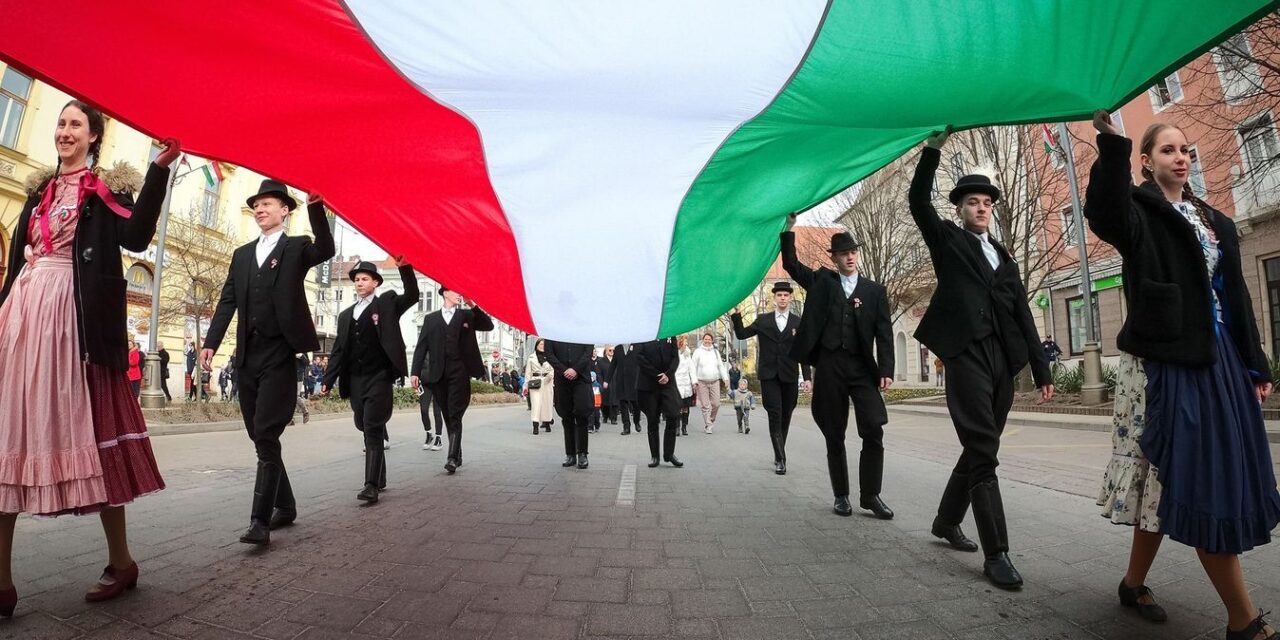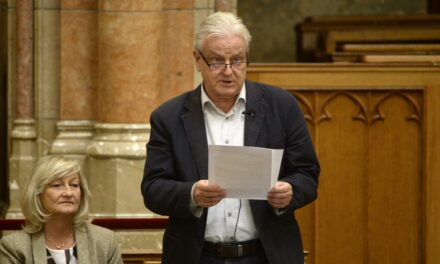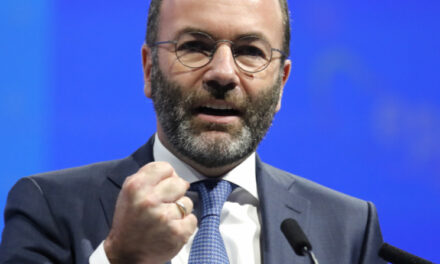A letter to an ex-boyfriend. Written by László Zöldi Szentesi.
We were fine, we are, but you don't understand us. You throw it in the eyes of Hungarians - where else but on Facebook, and to whom else but me - that our biggest problem is isolation. Also, we don't live in a multicultural world, so we don't know other people. Obviously, this is also why Orbán wins the elections again and again, you add. Finally, you allow yourself a deep stab at the fact that we should live together with others, then we would get to know other peoples, languages, and religions. While I'm reading you, I'm thinking that you shouldn't argue with me so much, rather argue with the Hungarian left, considering that they see us exactly as you do, from there, near Amsterdam.
Dear (former) friend, before I permanently block you from Facebook and banish you from my life forever, I will write something about it. I dedicate it to you, you will receive it in English as well, but first let's publish it in our paper, in Hungarian, for the edification of many. First of all, I recommend the following to those who, like you, have not noticed that
In Central Europe, people inherit multiculturalism, not brag about it. It's true, that's what we prefer to call this complex system of relationships: interaction.
That we would be blind, would we shut ourselves off from others, would we have stuck our heads in the sand like stupid ostriches throughout our history?
Even Árpád and the Hungarian tribal association were multilingual and made up of tribes, peoples, and genera of different origins. The Székelys, whose origins are unclear, but whether they were survivors of the Carpathian Basin or joined people, were not originally members of the Hungarian tribal confederation. Today, scattered but in spiritual unity, Hungarian culture and language are preserved.
Gyula Illyés said he was a descendant of Besheny, his ancestors did not organize themselves into a modern nation, but they live here among us, today's Hungarians. Kunos populate the lowland landscape from Karcag through Kiskunhalas to Bácsfeketehegy. The Jászs forgot their Iranian roots and assimilated into their Hungarian homeland. Palócs and Matyós also kept and keep the memories of their separation. Tatars, Turks, Böszörmen and others have melted into Hungarianness, they are here in our family names and vineyard names, in peace and unity.
Hundreds of thousands of Germans took up their homeland in Transdanubia, Transylvania, the Great Plain, and everywhere else, and then transferred their industrial, agricultural, and cultural knowledge to this country. ARC. Béla entrusted the Italian vineyards to Walloon settlers, who lived in the Burgundia village - today we mention Olaszliska. Jews came by the millions to trade, live freely, and do business. Gypsies visited all corners of the Carpathian basin to play music, cast clay, and make spoons.
A Serbian pope led his people here from the Turks, and they settled on the banks of the Danube. Croatian Catholic refugees came to us from Bosnia, from the Turkish or Orthodox majority, and became Hungarians. Slovak soldiers broke through with the Englishman Richard Guyon at the Branyiskó pass and opened the way for the liberation spring campaign. Romanian peasants performed their clap dance in Méhkerék, and no one asked them if they currently consider themselves Hungarian or Romanian.
János Arany drew the Czech brave with Toldi, and indeed, since Giskra and Svehla, how many times have we fought or even befriended each other. Hungarians hid Poles from Hitler on behalf of Miklós Horthy, and sometimes we married them or went to their jazz concerts, and they came here to drink Tokaj wine. Even you Dutch people lived here with us - Lajos Ápriliy wrote a beautiful commemorative poem about János Apáczai Csere's wife, Aletta van der Maet.
We, the Hungarian Reformed, sent our pastors and theologians to Dutch universities for several centuries. I don't think that in any neighboring country since János Kálvin, so many people have spoken Dutch as here. You obviously don't know who Admiral Ruyter is, but if you read it with great openness and a receptive spirit, you will realize that when he freed the captive Arab preachers, he also despised the foundations of Dutch-Hungarian friendship.
All these nations and people lived and live with us, and some of them became Hungarian and further enriched us. Us Hungarians, who - according to you - know nothing about the openness of the world. And they were our friends, and they are still our friends today, unlike you, who has no idea about anything, yet you stigmatize a nation that absorbed openness to the world with its mother's milk.
What else can I tell you about? About the many, many millions of Hungarians who gave the world a boost? Our Olympic champions and Nobel laureates, who were celebrated by the whole world, were not of Hungarian origin, but became Hungarian? Man, even in the Hungarian Golden Team, there are hardly any players whose original name, parents, and grandparents would be linked to the Hungarian nation - but was that important when we beat the English national team to death twice with thirteen goals scored?
Would we be stupid, uneducated, big losers of the past? Born in Mezőberény, Békés county, one hundred and twenty years ago, he lived his life knowing Hungarian, Slovak and German. Which language do you speak, my Dutch friend? Sándor Rózsa, the famous bandit leader - according to the custom of the time - could not read and write, but according to the documents, he spoke fluent Serbian and German in addition to Hungarian. Do you speak Serbian?
The translations of poems by Kosztolányi, Lőrinc Szabó and many other writers and poets from French, German, Italian, and a thousand languages are often better, nobler, and more apt than the original material. Every single Hungarian person, who was forced to grow up in another country after the dismemberment of our country, flows directly into Slovak, Romanian, Serbian, Croatian, Ukrainian, Austrian culture, speaks the language, and has friends, relatives, and neighbors from the other side as well.
Did you know about this too? Or is the dubious credibility of the lies published in the press enough for you?
Everything we have become celebrates the power of interaction. And that there was already some kind of spiritual content, character trait, attitude in Hungarians, which was worth sticking to for good. That is why we still exist here, in the middle of Europe. And we will stay, I'm telling you right now, because we are just as valuable, special and unique as any other nation.
So now, as I promised beforehand, I'm banning you. I don't think we have anything to talk about anymore. Think about what you have given to the world, okay? All of you, the former colonialists: English, French, Dutch, German, Belgian, Spanish and Portuguese. Because you know, the memory of the many, many tens of millions of Indians, Africans, and Asians killed by you cries out to the sky. And you owe your wealth to the fact that you methodically plundered the world. What surrounds you now was born not of openness, but of chaos.
For you have not known who you are for a long time. Besides, you know nothing about freedom, since you never had to fight for it.
Or if so, it's been quite a few centuries, my old friend. And what do you know about the Africans, Indians, Pakistanis, Vietnamese, Turks and Albanians who "live together" with you?
You avoid and despise them, but it is difficult to live with sin, so I liked you more as people of culture, while I have never experienced a more closed society, a colder system of human relations, and a colder attitude than you anywhere in the world.
I'm not talking about appearances, but about reality: about what you really think among yourselves about those with whom you should live, whom you invited to your country as slaves, because of course you no longer know how to work and you don't like to work, but you prefer to be wise over the fate of others.
Think about it. If you come, our mutual Hungarian friends will welcome you, but don't look for me. I don't have time for you, I don't care about your fate, and I don't think we should talk about anything after that.
Let's both stick to it.
Featured image: Photo: Zalai Hírlap/Pezzetta Umberto













